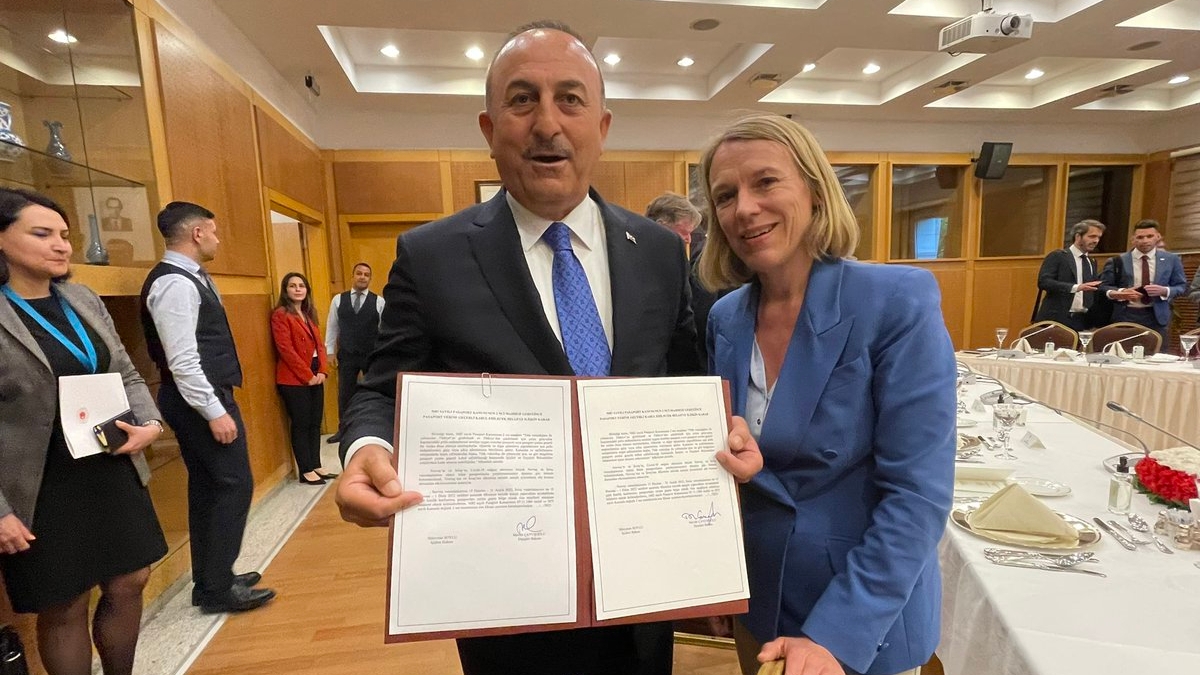Schengen: Turks increasingly being refused EU visas amid gruelling application process

Turkey's foreign minister, Mevlut Cavusoglu, and his Norwegian counterpart Anniken Huitfeldt, announced last week that Norwegian citizens would be allowed to enter Turkey for six months without a passport due to a shortage of the chips required for new passports in Norway.
In the replies below Huitfeldt’s tweet of the announcement, the frustration of Turkish citizens was easy to see.
Most of them were complaining about the difficulty for Turks in obtaining a Schengen visa, a system that allows free movement within 26 European countries and which Norway is a part of despite not being a member of the European Union.
A number of Turks highlighted the clear imbalance between Turkey and Norway's visa policies in relation to each other.
'Any EU citizen, including Greeks with whom we are rowing all the time, can easily enter Turkey without facing any questioning'
- Abdulkadir Ozveren, Turkish dentist
Twitter user AKA wrote: "Dear Ambassador, such news can only be good if the same conditions apply to Turkish citizens. Otherwise, Norwegian citizens already get an easy visa. Turkish citizens have to document seven generations of their family for a visa."
Opposition figures also criticised the government for not obtaining reciprocity in bilateral relations with EU countries.
Currently, EU citizens can enter Turkey without a visa, while Turkish citizens are obliged to make an application for a Schengen visa to enter the EU via a commissioning company, declare dozens of documents, pay hundreds of Euros and wait weeks for a decision.
The list of documents that a Turkish citizen must submit to obtain a short-term Schengen visa includes:
Passport, expired passports, copies of previous US, UK and Schengen visas, copy of Turkish identity card, application form, biometric photograph, health travel insurance, visa fee, proof of hotel booking, proof of flight booking, letter from workplace that specifies the applicant’s salary, vacation duration, date of recruitment, circular of signature, good standing certificate, trade registry gazette, copy of tax certificate, working documents from social security institution, work contract, documents that prove income such as bank statements with an official signature, deeds of properties, and a deposit that requires the applicant to keep a certain amount of money in their account.
If the applicant is a student, certificate of enrolment and the above-listed documents of his/her parents are required along with a sponsorship letter. If the applicant is unemployed, a sponsorship letter from one of his/her relatives is needed.
'Frustrating and even humiliating'
Each EU country works with a commissioning company, which collects these documents and sends them to the relevant consulate or embassy.
After collecting all the documents, the applicant must next book an appointment with the commissioning company.
Long queues outside the commissioning companies' offices are common, as their appointment system is often faulty.
Frustrated customers are increasingly filing complaints against the companies over their lack of professionalism in dealing with applications, according to a media report last month.
Embassies charge €80 ($84) as part of the process, while the commissioning companies charge about another €60 ($63) for each applicant.
There is no guarantee of being granted a visa and most countries do not get back to applicants with a decision before at least 15 working days, amounting to three calendar weeks.
Sharing a photograph of the mass of documents that he had had to collect to apply for a visa, social media user Tamer Avci wrote: “Unacceptable how many documents you have to present to get a Schengen visa if you hold a Turkish passport. This treatment is despicable.”
Unacceptable how many documents you have to present to get a Schengen visa if you hold a Turkish passport. This treatment is despicable
— tamer (@tamer_avci) June 18, 2022
Not to mention they usually give you a week long visa unless ofc you apply from the US. Then you get at least a year pic.twitter.com/YWUufOroPO
Furthermore, Avci pointed out that even if a Turkish citizen holds a valid visa, irritating questions still await at the border, such as the length of the traveller's stay or details of their hotel booking.
Speaking to Middle East Eye, Abdulkadir Ozveren, a dentist who frequently travels abroad for conferences, explained:
“This is frustrating and even humiliating. Any EU citizen, including Greeks with whom we are rowing all the time, can easily enter Turkey without facing any questioning or whatever. This treatment by the commissioning companies as well as at the border is unacceptable.”
Ozveren says it took slightly more than a month for him to get a visa.
“Another problem is that we spend a lot of time and money. But at the end, they issue a visa that allows your stay between specific dates, which is generally not more than a week,” he said.
“If you need to visit an EU country, let’s say one month after your last visit, you must go through the same process again.”
Deteriorating economy
Ozveren and Avci were lucky enough just to obtain their visas, with the rate of refusal for Turkish citizens increasing every year.
According to a report published by Dunya daily, the refusal rate rose to 19.02 percent in 2021.
The figures show the steady increase in refusals over past years, with 13.78 percent rejected in 2020, 10.45 percent in 2019, 9.02 percent in 2018, seven percent in 2017, 4.98 percent in 2016 and 4.29 percent in 2015.
In financial terms, the refusals have cost Turkish citizens €26m ($27.6m) over the last five years, while successful applicants forked out more than €315m ($332m) in the same time span.
Sinan Ulgen, head of the Istanbul-based think tank Edam and a former member of the Turkish permanent delegation to the EU, said the reason for the refusals, or granting of shorter visas, is linked to the increasing migration of Turkish citizens to Europe and Turkey's deteriorating economy.
“The disputes between Turkey and the EU over certain issues have been there for decades," he told MEE.
"The growing reluctance to issue visas for Turkish citizens is related to the changing conditions in Turkey.”
Last year, Turks ranked fifth highest out of all countries regarding the nationalities of first time asylum applicants to the EU.
Missed opportunity?
In March 2016, then Turkish prime minister Ahmet Davutoglu declared proudly that Turkish citizens would be waived from visa requirements for the Schengen zone from June 2016, following the signing of a refugee deal with the EU.
However, not only did the change never happen, things got even worse.
The EU proposed 72 criteria for Turkey to fulfil for visa-free travel. While Turkey fulfilled 67 of 72, the remaining five criteria sparked further disputes.
The remaining issues are: to comply with EU standards on personal data legislation; ensure judicial cooperation with EU member states on criminal matters; finalise an operational agreement with Europol; continue to fight corruption; and reassess legislation practices on terrorism in line with EU standards.
In fact, an EU Commission report on Turkey in 2021 mentioned further reasons for not granting visa-free travel to Turkish citizens.
For instance, lifting visa requirements for Iraqi nationals, allowing the entry of Azerbaijani citizens with a national ID card, or Turkey's dispute with Cyprus, were also quoted as reasons in the report.
Ulgen believes that Turkey had the upper hand in 2016, but failed to meet the required criteria despite the fact that the same criteria is imposed on any country that lies in the EU’s expansion area, or adjacent territory.
“For instance, Serbia had to undergo the same procedure,” said Ulgen, adding that “if Turkey had fulfilled all criteria, it would have been almost impossible for the EU to not waive visas.”
Nacho Sanchez Amor, the European Parliament's standing rapporteur on Turkey, said in an interview in March that Turkey had not taken any steps to change its anti-terrorism law, as demanded by the EU for visa liberalisation.
"It would not be possible to talk about visa liberalisation now," he added.
According to Ulgen, the changes requested in the anti-terrorism law would not harm Turkey’s ability to combat terrorist groups on the ground, but instead protect thinkers or writers from being treated as terrorists.
Turkey continues to be the only official EU candidate country that lacks visa-free travel access to Schengen countries in the bloc's history.
The fact that Venezuelan citizens can enter the Schengen zone without a visa, or that the EU has began working on a scheme to exempt Saudi Arabian citizens from needing visas, has been met with accusations of hypocrisy towards the EU by most Turkish social media users.
Middle East Eye propose une couverture et une analyse indépendantes et incomparables du Moyen-Orient, de l’Afrique du Nord et d’autres régions du monde. Pour en savoir plus sur la reprise de ce contenu et les frais qui s’appliquent, veuillez remplir ce formulaire [en anglais]. Pour en savoir plus sur MEE, cliquez ici [en anglais].






